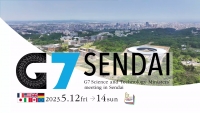The development and management of new technology are fundamental to addressing social issues and fostering social innovation. Taking this into consideration, G7 will pursue initiatives aimed at achieving an open and evolving research ecosystem based on trust, through three key points: respecting freedom and inclusion in scientific research and promoting open science, promoting reliable scientific research by ensuring research security and research integrity, and international collaboration in science and technology to address global challenges.
The G7 Open Science Working Group (OSWG) was established during a meeting of G7 member countries in 2016, with the aim of promoting the implementation of FAIR principles and open science by improving the quality and impact of interactions between science, policy, and society. Its mandate was extended in 2021, with G7 member states dedicating themselves to work on open science and promoting effective processing and exchange of scientific data within and beyond the G7.
To achieve these goals, the Working Group (OSWG) issued recommendations for supporting and collaborating in the field of open science. The recommendations are presented in three areas: research on research work, research evaluation and incentives, and interoperability and sustainability of research infrastructures.
Recommendations for research on research work include: deepening international research on open science, strengthening coordination and knowledge exchange; using research on research work as a framework for monitoring the state and development of open science, and assessing the "state of knowledge" in the field of research on research work for informed decision-making and policies.
In the context of research evaluation, transformation/reform of the research evaluation system is recommended to promote open science and evaluate a greater diversity of types of research results, activities, and practices. It is also recommended to promote continuous engagement of stakeholders throughout the research system to expedite the research evaluation process, global collaboration, and mutual learning to encourage and maintain coherent practice. Developing open and transparent scientific indicators that can be used to evaluate research, ensuring necessary infrastructure and support for open science practices, providing training enabling researchers to practice open science, and supporting the development and use of indicators are also recommended.
Research on open science infrastructures during the COVID-19 pandemic led to conclusions highlighting the importance of sharing data and other research results, their availability, and comparability, for accelerating science and decision-making. Consequently, promoting international collaboration in the development of open science infrastructures is recommended, using successful existing collaborative relationships and exploring new possibilities within the G7 group and beyond. Defining and adopting common principles and practices for open science infrastructures to improve interoperability and promote data availability while respecting security and privacy is also recommended.
G7 continues collaboration in the field of open science, particularly promoting interoperability, transparency, collaboration, and trust in open science infrastructures, open and public access to scientific publications, sharing research data, investigating research evaluation approaches that promote qualitative assessment, promoting research management practices and research data management in accordance with FAIR principles, and encouraging the monitoring of progress and challenges in open science implementation.
Authors: Lorena Palameta and Sanja Jurković
________________________________________________________________
[1] G7 refers to a group of seven leading economies in the world representing the global economic elite. It consists of the leaders of the governments of the United States, Canada, Japan, Germany, Italy, France, and the United Kingdom, with the presidents or heads of the European Union and the and the European Commission participating in the meetings.

